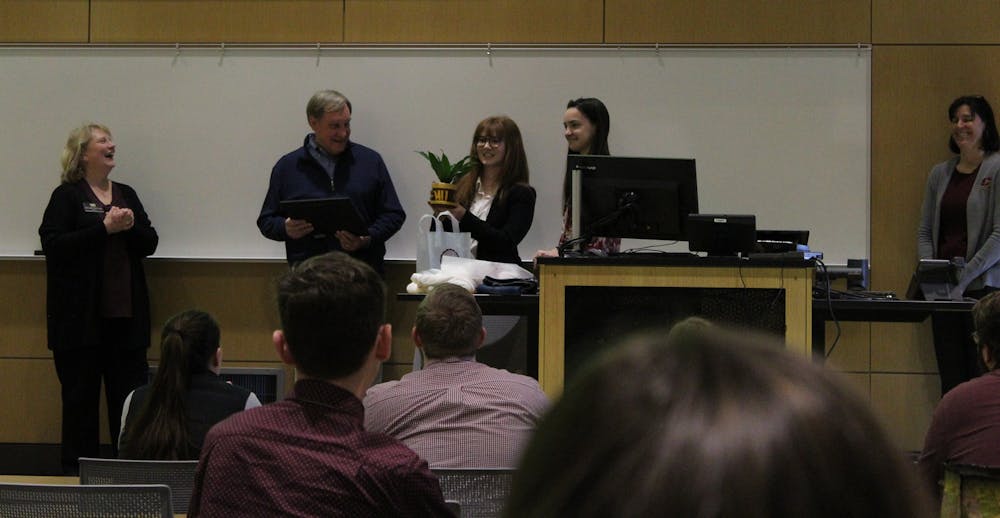Environmental Advocacy Conference models a sustainable college town

Sustainability Coalition chair Meredith Wiles presents former assistant Residence Life director Grant Skomski with a plaque and potted plant to celebrate his work making Central Michigan University's campus more sustainable at the Environmental Advocacy Conference in the Biosciences building, Friday, Feb. 7.
“Life is too short to run out of toilet paper.”
That’s one of the central tenets of the Care Store, a Mount Pleasant non-profit which provides personal and household care items, its director, Kim McBryde, said at the third-annual Environmental Advocacy Conference in Central Michigan University’s Biosciences building Feb. 7.
At first glance, it would seem the conference was called to tout the valor of Isabella County’s poverty-fighting non-profit organizations. But poverty isn’t the only thing you can help by reusing and repurposing your old clothes, extra food and household items. It’s also good for the environment.
“The intentional act of giving what we have and no longer want to help others around us is something I think we all want to be doing and are excited about,” said Cedar Springs junior Meredith Wiles, chair of the CMU Sustainability Coalition and the conference’s presenter. “We know that it helps the people around us.”
Advocates at CMU are pushing the university and its surrounding community to demonstrate what a sustainable college town can look like, and it means more than recycling.
The conference’s keynote speaker was Luanne Goffnett, residence hall director for Calkins and Robinson halls. Over 10 years ago, Goffnett established CMU’s end-of-year donation drive, which collects unwanted items left behind by CMU students, sorts them and redistributes them into the community. Goffnett “probably helped invent the word sustainability on this campus,” former assistant director of Residence Life Grant Skomski said.
The drive began as a “small gesture” and grew into a fixture of campus life, Goffnett said. Originally limited to Barnes Hall, where she was a residence hall director, the drive expanded to Calkins Hall and was reinforced by a variety of city organizations before CMU ultimately supported it through partnerships with Facilities Management and Residence Life.
Moving out of a college dorm produces a lot of trash. Students often accumulate many more items than they came to school with and aren’t able to put it all back in their cars. Last year, the donation drive filled three conference rooms in Kulhavi Hall with move-in carts overflowing with surplus items.
These concerns aren’t limited to campus, though. True sustainability takes partnerships with community organizations like those that appeared at the Environmental Advocacy Conference. The organizations largely rely on reusing and repurposing items donated by the community. Some of these organizations included:
- The Care Store, which redistributes basic necessities not covered by federal aid, such as cleaning items, kitchen supplies, hygiene items and toilet paper. McBryde said the store helps about 100 families each week. Goffnett’s end-of-year donation drive is a “big help” in keeping these items in stock, McBryde said.
- Community Compassion Network, which provides a food pantry and supplies for caring for infants. CCN board member Sarah Gilbert said the network helps feed about 1,500 households each month with food that costs about 12 cents per pound.
- Clothing INC, which provides free clothing by appointment. You can schedule an appointment every four months, and they aim to give out a week’s worth of clothes each time. They often repair brand-new clothing with damage that kept it off store shelves, resulting in like-new pieces from well-known brands, said executive director Kaye Peasley.
Moving forward, one of the chief sustainability goals on CMU’s campus is earning a Gold rating in the Sustainability Tracking, Assessment & Rating System (STARS), a program which ranks the efforts of colleges and universities, said Health Professions Residential College director Pat Cwiek, who helped found the Sustainability Coalition around three years ago.
Currently, CMU has a Silver rating, and its lowest-scoring aspect in comparison to other institutions is its water use.
To improve its score, CMU will have to focus on increasing sustainability awareness on campus by incorporating it into the curriculum and fostering student-led involvement, which is where the Sustainability Coalition comes in, Cwiek said. Initiatives like the Green Teams -- where volunteer students sweep through six residence halls collecting recycling each week -- are facilitated through the coalition.
The CMU Sustainability coalition meets monthly from 3-4 p.m. in the Biosciences building, room 2010. Their next meeting will be on Friday, Feb. 28.






